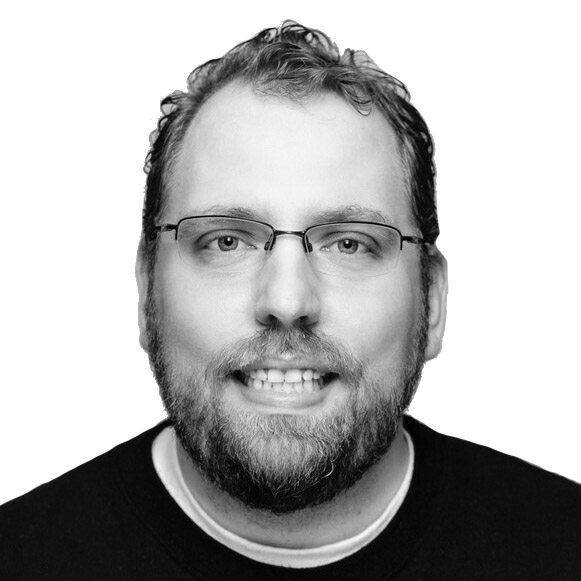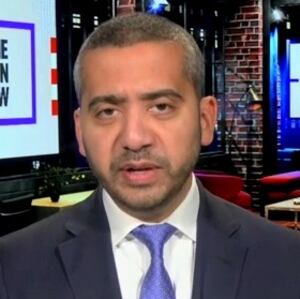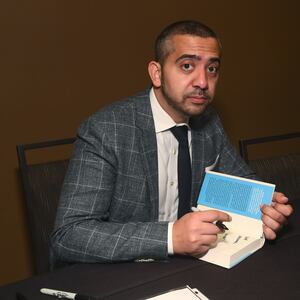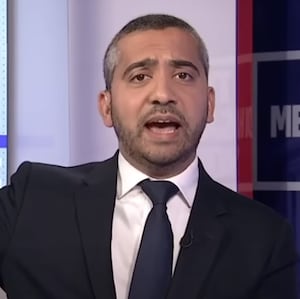Three months after signing off from MSNBC for the final time, Mehdi Hasan believes he is proving all of his “doubters wrong.”
Weeks after announcing the launch of his new media venture, Zeteo, the unapologetically progressive Hasan will on Thursday debut the company’s flagship podcast, We’re Not Kidding. The podcast will air twice a month and feature new Zeteo contributor Bassem Youssef as its first guest. Youssef, known as the “Jon Stewart of the Middle East,” will, in fact, be a fixture on the show and appear on every other broadcast.
In its infancy, Zeteo has already become a rousing success on Substack, a platform that has become a primary hub for independent writers and commentators. Hasan boasts that it’s already hit over 160,000 total subscribers on Substack, with 20,000 of those paid. Besides We’re Not Kidding, he also has a weekly political podcast, titled Mehdi Unfiltered, as well as a growing list of newsletters from established left-leaning authors and journalists.
Speaking to The Daily Beast this week, Hasan shared what the future holds for Zeteo and his vision for the company, but also how he views the state of the mainstream media today and its inability (or unwillingness) to properly cover the war in Gaza.
“The American mainstream media's coverage of the conflict has been, in many ways, shameful. We have failed to humanize Palestinians,” he emphatically declared.
As he has done in other recent chats, Hasan also shared much detail about his high-profile exit from MSNBC. His January departure from the network, of course, came after his Sunday night talk show was canceled amid what the network described as merely a part of a broader restructure of its programming.
Coincidence or not, MSNBC canceled Hasan’s weekend and Peacock shows just two weeks after the famously aggressive interviewer relentlessly grilled Mark Regev, a senior adviser to Israeli Prime Minister Benjamin Netanyahu, about the rapidly rising Gazan death toll from Israel’s response to the October 7 Hamas attacks. (According to New York Magazine, a source said that “they needed a sacrificial lamb” to “show that someone lost something of value because of the Israel-Gaza stuff.”)
Whether he was indeed a “sacrificial lamb” made to pay for his outspoken criticism of Israel or not, Hasan is intent on using his new platform to speak out against what he sees as the media’s malpractice in not only its coverage of Gaza but also the growing pro-Palestinian protests across college campuses.
“No,” he flatly said when asked if the anti-war demonstrations at Columbia University and elsewhere have been covered fairly.
“The reality does not match what we've been told on social media or in some of the more hysterical op-eds,” Hasan added. “So I think the reporting in general has been shoddy. And then in terms of the substance of it, of course, it’s bias.”
Meanwhile, amid breathless claims from elected leaders and cable news pundits that the protests show Columbia and other schools have become a breeding ground for violent antisemitism, Zeteo published a first-person account from a Jewish student pushing back on those “smears.”
“I still can’t quite believe how the events on campus over the past few days have been so cynically and hysterically misrepresented by the media and by our elected representatives,” the essay stated.
This interview with Hasan has been lightly edited for brevity and clarity.
This week marks the launch of We’re Not Kidding, and you’ve also announced that Bassem Youssef, known to American audiences as “the Jon Stewart of the Middle East,” has joined your company as a contributor and will appear on every other episode. What do you plan on discussing in the first few shows?
We talk a lot of personal stuff about our lifestyle choices with him being Arab, me being of Indian descent, and how neither of us became doctors. [Laughs] We talk about the role of media, what we can do now, why we've become so outspoken on Gaza. We talk about some of the controversies we've been involved in.
Obviously, every show will be different, but it was the first show so we were kind of laying out where we're coming from, a little bit about our background, and how we met each other, so it's quite good. For me, it was very interesting to do because I’m sitting in a hoodie with a comedian talking about personal stuff.
People don’t normally see me like that and Bassem made fun of me in the first episode because he doesn’t believe I don’t wear a suit and tie to bed. He thinks I’m just pretending that I actually wear casual clothes when I’m not doing interviews. But people know me as this kind of combative serious interview guy from TV. And that’s part of who I am, but it’s not the only part.
Any other guests we should expect?
One of our contributors is W. Kamau Bell. Kamau will also be guest-hosting the podcast at some point, too. We just put out a new show today, our second episode of Mehdi Unfiltered, which is our other product, our weekly main politics show. And that featured Cornel West and Cynthia Nixon, who is one of our contributors. Cynthia talking about Columbia protests; Cornell talking about his presidential campaign.
So we've hit the ground running. We've been high-impact. We’ve tried to make some noise. We’ve tried to produce journalism that’s distinctive. We’ve tried to offer products that people aren’t expecting. I mean, John Harwood’s weekly newsletter, I think it surprised a lot of people.
Will Youssef contribute elsewhere on Zeteo?
No, just the podcast.
You’ve announced a number of prominent journalists and progressive media figures who’ve joined as contributors, including John Harwood, Greta Thunberg, Spencer Ackerman, Owen Jones, Rula Jebreal, and Naomi Klein. Should we expect some more announcements in the near future?
We’ll definitely get more announcements out on what we’re doing. Actually, we're going to be doing something very interesting that we'll be announcing in a couple of weeks that is neither a newsletter nor a podcast but is really, really important journalism that I think will make a lot of noise right now in the current news agenda related to what's happening in the Middle East. That's coming up in a couple of weeks. So yes, we’re not just doing everything you think we’re doing. We’re doing more.
Most of these contributors, including yourself, are all known for rather decisive points of view. Was that intentional? And why was it important to launch with these voices with clear points of view instead of more straight-news personalities?
So Zeteo is not a straight news organization. We don't have news bureaus abroad. We don’t have reporters on board—though that might change. But in “Phase One,” if we want to call it that in the Marvel language, we’re trying to make noise and impact and give a voice to people whose voices need to be amplified. And you know, one of the driving principles behind this organization is the idea that there's far too much censorship of interesting and important views going on in our media industry. There’s far too much restraint when it comes to speaking plainly about the state of the world, from too many people in our news industry, and thereby we wanted to amplify voices of people who are bolder, who are not afraid to speak up.
Let me give you one example. Cynthia Nixon—actress, activist, former gubernatorial candidate—she said on the show today, when I asked her about Hollywood and how come she's speaking about Gaza and others aren't, she was very bold about the fact that there is a climate of fear and censorship and people are worried about being labeled antisemitic. I’ve spoken to a lot of celebrities and asked them to come on board, and they say, “Look, I can’t do it right now.”
So I appreciate giving Cynthia a platform. I think someone like Naomi is a public intellectual and New York Times bestselling author. She’s been at places like The Intercept when I was at The Intercept. She doesn’t need me to give her a bigger platform, but I want to be someone who gives her a platform because of her voice. That’s so important right now, both on things like Israel and Egypt, but of course, climate justice and economy-related. So that’s what drives me.
Look, within the left-liberal spectrum, I tried to get a diverse set of voices, and we’re still working on that. Somebody’s like, “You don't have any right-wingers.” Yeah, I don’t! What we do have is John Harwood, whose politics are different than Kamau’s politics, which are different than Bassem’s politics.
You’ve noted that Zeteo already has over 20,000 paid Substack subscribers and 160,000 total subscribers since its launch. You recently told New York magazine that you currently have five full-timers, and are planning on at least ten total. Are you looking to staff up in the near and long-term future?
Very much so. And any talented people reading this should email me.
Much of Zeteo’s coverage has focused on Gaza and criticism of the way Israel has waged its war against Hamas, resulting in over 34,000 dead Gazans—a large percentage of which appear to be women and children. Considering your own outspoken stance towards the situation in Gaza and Israel, what are your thoughts on the mainstream media’s coverage of this conflict?
The American mainstream media's coverage of the conflict has been, in many ways, shameful. We have failed to humanize Palestinians. We have failed to give attention to the sheer level of death and destruction. We've failed to call attention to the fact that Israel is censoring international media and not allowing journalists in, which is fundamental to our coverage of what's going on. And we have treated Israel and Israel spokespersons, on our airwaves and in our news pages, with kid gloves in a way that we will never treat any other government doing what Israel is accused of doing by multiple human rights groups and the United Nations.
Is the media equipped to handle this correctly?
That’s a very good question. I think foreign policy in general has always been a weak spot for American politics and American media. A lot of newspapers, and a lot of media organizations, have cut back for budget reasons on foreign coverage. That's not to say there aren’t excellent foreign correspondents. And there are. Actually, Sky News, which is owned by Comcast and was owned by Rupert Murdoch back in the day, has done some of the best reporting from outside of Gaza in terms of people. Alex Crawford, my old friend Mark Stone, and Dominic Waghorn.
Look, in general, American media does struggle with the details of foreign conflicts and foreign coverage but also getting people in America to pay attention to foreign conflicts and foreign stories. I just think if we humanize the coverage—we had Ukraine a year before Gaza. And for me, that's fascinating. I always go back to Ukraine and say, “Alright, we have an analogy in real time. How did the media cover Ukraine versus how we covered Gaza?” In Ukraine, we were able to call it a moral issue. In Ukraine, journalists didn’t worry so much about neutrality or impartiality. We called out Putin. We called out the Russians. We called it an illegal invasion. We called it a genocide.
In Gaza, we run around with kid gloves, we bend over backward to be fair to a government that is engaged in genocidal rhetoric and at the very minimum, basic war crimes on the ground. And I find it fascinating that we are not—let's be honest. You know and I know we’ve spoken to people in the media behind the scenes who want to say more about this stuff but are worried. They’re worried about their careers being ended. They're worried about being accused of antisemitism. They’re worried about being accused of bias. It’s a problem.
It feels like personal biases get in the way of everything no matter how good a reporter you are? Do you agree?
Yeah, of course. My position of personal biases is I have a lot of bias, right? So I own my bias. I own my opinions. What bothers me is we live in this landscape where people pretend that they’re not biased. I would rather people own up to their biases, and then actually do journalism in an impartial way. And when I define impartial, that doesn’t mean splitting the difference. That means being fair. That means not allowing your views to affect your coverage of the facts, for example.
So you know, Peter Baker, a reporter I have a great respect for, he talks a lot about how he doesn't even vote. I just find that kind of stuff self-defeating. What? It doesn't mean you’re not a political person. It doesn't mean you're a political guy. We all do! We’re human beings. Yeah, I think we should own up to that.
I would also point out that there’s a double standard whereby, you know, I don’t have the names or numbers on hand, but you can look it up. But The New York Times has employed people to cover the Middle East who have had family members in the Israeli military. And I think that should be something that's problematic, at the very least, and much more openly discussed and declared. The editor of America's premier political magazine, The Atlantic, served in the Israeli military, I think it was during the First Intifada, if memory serves me correctly.
I'm not saying that people shouldn’t be able to write and do other things. I’m just saying, let’s be clear about where we all stand. There seems to be an assumption that it is just the brown Muslim folks in the media who have a bias, not the white Christian or white Jewish or white atheist folks who come to this conflict and this issue with all sorts of biases, prejudices, and backstories that affect their views.
Over the past week, it feels like there have only been two news stories that cable news has focused on: the Trump trial and the anti-war protests at Columbia. Do you feel these demonstrations have been covered fairly?
No.
Put aside the politics of it, right? Just in terms of student coverage, our media is horrible. I saw someone tweet yesterday that maybe making the utterances of a 19-year-old on campus the centerpiece of all our media coverage for the last few years, maybe that wasn't a helpful thing to do. And I agree with that.
This predates Gaza, Justin. We've been obsessed with campus politics, campus wars, cancel culture, and snowflakes for years now! In both liberal media and conservative. So this all just feeds into pre-existing trends. And I think it’s partly to do with New York media. Where do these people's kids go to school? It's funny, these are all Ivy League universities. Why aren't we hearing about the Gaza protests at community colleges? Instead, it’s Yale and Columbia and Harvard. Weird, huh? Aren’t there thousands of other universities and colleges in this country? Where's the context? So there's a lot of context missing when we're covering the stuff.
And just on the politics of it. This idea that we all go crazy hysterical because— and I'm not denying it, people have said some horrible things. I've seen the videos. But the majority of protesters are not antisemitic. Many of them are Jewish, and it is frustrating for those of us who are brown or Muslim or Black. There have been countless episodes of racism and violence against Black and brown communities on campus for years. Where were the congressional delegations then? Where was the 24-hour rolling coverage then? I didn't see it!
Columbia students were hit with skunk spray a month or two ago. Only The Intercept really covered it as a major story, and Columbia University didn't even do anything until it felt pressure. That was a pro-Palestinian protest, and no one cared. So I just think the way we're covering this is disproportionate. It’s hysterical. It’s one-sided. And a lot of the facts on the ground are wrong. Antonia Hilton from NBC News, a brilliant reporter, actually went to Columbia. “I’m on the ground in Columbia. I'm walking around.” The reality does not match what we've been told on social media or in some of the more hysterical op-eds. So I think the reporting in general has been shoddy. And then in terms of the substance of it, of course, it's bias.
Do you think that the media coverage leans too heavily (or easily) on equating anti-Israel and/or anti-Zionist sentiments to antisemitism?
That’s been the debate that's been rolling for days. I just agreed to do a debate at the Toronto Munk Debates on this very topic in June. It’s a real problem conflating anti-Zionism and anti-Israel criticism to antisemitism. I’ve seen it online, people are attacking me. I spent my entire adult life, most of my professional career, opposing antisemitism in Muslim communities, in left-wing communities and in right-wing communities. Anti-Jewish hatred is very real, is on the rise, and is very dangerous. We should call it out. But what we shouldn’t do is minimize it or, quote-unquote, weaponize it by using it against Jewish protesters against Israel.
That's the great irony. Remember when there was a huge protest outside the DNC that got very unruly, early on after October 7 and somebody in the Democratic Party said, “This is antisemitism”? Those were all [Jewish Voices for Peace]—those were Jewish Palestine protesters. That’s not antisemitic. And you know, some of the slogans like “from the river to the sea,” and the Intifada, those are not inherently antisemitic slogans. They can be used in an antisemitic way. If you go write it on a synagogue, that's antisemitic. If you say in a protest, referring to Israel, you know, it's not antisemitic. And all roads lead back to context.
As we’ve discussed, much of the media’s focus on the protests has been over what it describes as “antisemitism” and “threats of violence” against Jewish students by pro-Palestinian protesters. And it isn’t just the media coverage that has framed these protests as violently anti-Jewish. The White House, the New York City mayor, and New York governor have railed against them while the head of the ADL has specifically urged the National Guard to get involved.
Anyone urging for the National Guard to be brought in, that’s embarrassing. We know what’s happened in the past when the National Guard has been brought in—people have died. It's crazy that people are comparing this to Charlottesville where actual people were killed, a counter-protester. People comparing it to Charlottesville is so ironic because the people you’re demonizing in Columbia are exactly the people who were protesting in Charlottesville.
By the way, the Israeli government from its official Twitter account referred to American students in Columbia as terrorists. I would like to see the White House stand up for American citizens against a foreign government calling them terrorists rather than join in with the kind of online mob attacks on the students. And it's just deeply depressing to see the way in which this bandwagon keeps going. Meanwhile, there were reports of new mass graves in Gaza, bodies being found with hands zip-tied together. There are kids still being killed in airstrikes in Gaza. That coverage has gone away because we’re much more obsessed with what’s happening on the campus of a university in New York that some journalists’ kids probably have gone to.
And you can just contrast coverage of the protests with that of the mass grave in Gaza, which barely got a blip compared to the round-the-clock focus on Columbia…
Let’s just compare college coverage to college coverage. Let’s compare the cancellation of a USC valedictorian, Muslim woman in hijab, having her speech canceled. Did you see even one percent of the national outrage, political outrage, governmental outrage over that versus what’s happening in Columbia? Let's go broader. Three students in Vermont, Palestinian descent, shot. One of them paralyzed. Did we see the same level of hysteria and anger about Islamophobia and anti-Palestinian bigotry there? A six-year-old boy killed, stabbed to death in Illinois, and shortly after October 7. Did we see the same level of coverage, hysteria, anger?
I mean, this is a thing. There is bigotry on the rise across the board. Let us not act as if it's only antisemitism, which is a problem. There's Islamophobia. There’s anti-Black racism. Minority communities notice when people in power only care about one group or try and pit one group against another. What's so admirable about the Columbia protest is is you have Palestinians, Arab-Americans Jewish-Americans, liberal atheists all together calling out a genocide.
I understand you’ve largely evaded questions about your exit from MSNBC and described it as “amicable.” You’ve said you both have agreed to move on from the past, and you’ve even left the door open to returning as a guest. At the same time, in the recent New York magazine profile, an MSNBC employee said that “Around October 7, context was not welcome” at the network. “Context was a bad word. Empathy for Palestinians almost felt forbidden inside MSNBC,” this person added. Other employees reportedly lodged complaints to human resources about colleagues they felt were expressing views that were “too pro-Palestinian.” Would you say this is a fair assessment of your own experience?
I can’t speak about complaints or HR, I never heard of any complaints against me specifically. But I would say that across the U.S. media as a whole, context has been missing on this conflict, and empathy for the Palestinians has been missing. In my journalism at MSNBC, I tried to provide context, I tried to provide empathy. I interviewed a Jewish man who lost his parents to Hamas on October 7, and I also interviewed a Palestinian in Gaza who was having to flee their home. So I've always tried to do that. I think the U.S. media in general—it’s not about MSNBC or CNN, it’s a structural problem. That we don't empathize. We don't humanize one side of this conflict. And that’s the root cause of a lot of our coverage issues.
Do you have one final message?
A lot of people thought I was crazy to start a company like this after leaving MSNBC in a short space of time. I think we are very quickly proving any of our doubters wrong, and I think we are making a lot of noise and impact.









